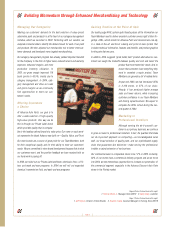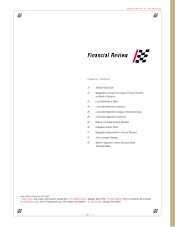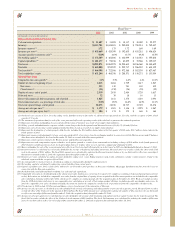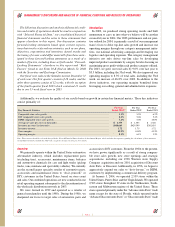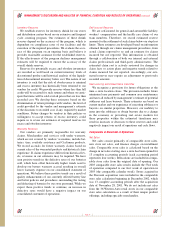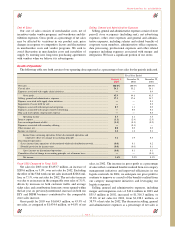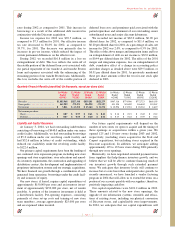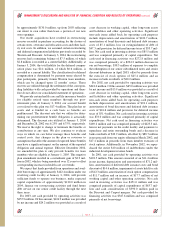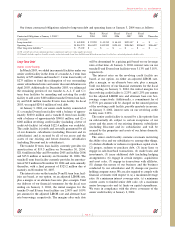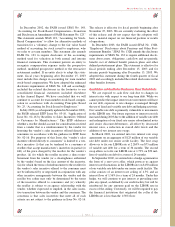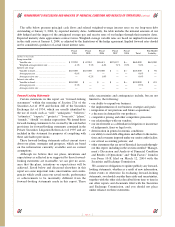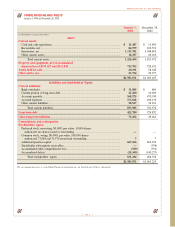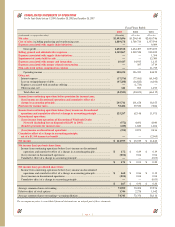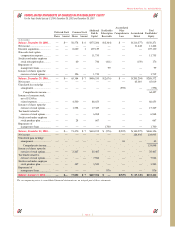Advance Auto Parts 2003 Annual Report Download - page 18
Download and view the complete annual report
Please find page 18 of the 2003 Advance Auto Parts annual report below. You can navigate through the pages in the report by either clicking on the pages listed below, or by using the keyword search tool below to find specific information within the annual report.
primarily a result of a decrease in merger and integration
expenses related to the integration of Discount. These integra-
tion expenses are related to, among other things, overlapping
administrative functions and store conversion expenses. The
decline in merger and integration costs was anticipated as
we near the completion of the Discount integration.
Excluding the impact of the merger and integration costs,
the decline as a percentage of net sales is a result of lever-
aging our fixed costs with the impact of the 53rd week of
operations in the fourth quarter of 2003.
Interest expense for 2003 was $37.6 million, or 1.1% of
net sales, as compared to $77.1 million, or 2.4% of net
sales, in 2002. The decrease in interest expense is a result of
lower overall interest rates resulting primarily from our
redemption of our outstanding senior subordinated notes
and senior discount debentures in first quarter 2003.
Additionally, the decrease is a result of overall lower debt
levels in 2003 as compared to 2002, due to our use of free
cash flow to pay down debt.
Income tax expense for 2003 was $78.4 million, as
compared to $39.5 million for 2002. Our effective income
tax rate decreased to 38.5% for 2003, as compared to 38.8%,
for 2002. The decrease in our effective tax rate was primarily
due to increases in pre-tax income, which reduced the
impact of certain permanent differences on the effective rate.
During 2003, we recorded $47.3 million in a loss on
extinguishment of debt. This loss reflects the write-off of
deferred loan costs and premiums paid to redeem our senior
subordinated notes and senior discount debentures during
the first quarter of fiscal 2003, and also includes the related
financing costs associated with amending our senior credit
facility to finance this redemption. Additionally, this loss
includes the ratable portion of deferred loans costs associ-
ated with the partial repayment of our term loans during
fiscal 2003.
We recorded net income of $124.9 million, $1.67 per
diluted share for 2003, as compared to $65.0 million, or
$0.90 per diluted share for 2002. As a percentage of sales,
net income for 2003 was 3.6%, as compared to 2.0% for
2002. The effect of the expenses associated with merger and
integration and loss on extinguishment of debt on net
income was $35.5 million, or $0.47 per diluted share for
2003 and $32.0 million, or $0.44 per diluted share for 2002.
As previously mentioned, these per share amounts reflect
the two-for-one stock split declared in 2003.
Fiscal 2002 Compared to Fiscal 2001
Net sales for 2002 were $3,204.1 million, an increase of
$784.4 million, or 32.4%, over net sales for 2001. The net
sales increase was due to an increase a full year’s contribution
of sales from stores acquired in the Discount acquisition, in
the comparable store sales of 5.5% and contributions from
new stores opened within the last year. The comparable
store sales increase was a result of growth in both the DIY
and DIFM market segments (indicated by an increase in
both comparative customers and average customer sales), as
well as the continued maturation of new stores.
Gross profit for 2002 was $1,434.4 million, or 44.8% of
net sales, as compared to $1,053.1 million, or 43.5% of net
sales, in 2001. The increase in gross profit as a percentage
of sales reflects more favorable merchandise costs realized
in fiscal 2002 as a result of renegotiating merchandise
contracts after the Discount acquisition. Additionally, this
increase represents our ability to leverage logistics costs
primarily driven by a review of our logistics operations,
which occurred in connection with our supply chain initia-
tives. We began these initiatives during the fourth quarter of
fiscal 2001, in which we recorded a $9.1 million charge for
restocking and handling fees associated with the return of
inventory under these initiatives.
Selling, general and administrative expenses increased to
$1,238.1 million, or 38.7% of net sales for 2002, from
$968.6 million, or 40.0% of net sales for 2001. Selling,
general and administrative expenses include merger and
integration expenses related to the integration of Discount of
$35.5 million, or 1.1% of sales, and $4.9 million, or 0.2%
of sales, for 2002 and 2001, respectively. These integration
expenses are related to, among other things, merger related
restructuring, overlapping administrative functions and
store conversion expenses. The merger related restructuring
charges primarily relate to lease costs associated with
closed Advance Auto Parts stores in overlapping markets as
a result of the Discount acquisition. Additionally, selling,
general and administrative expenses include charges of
$25.4 million, or 1.0% of sales, in 2001 as detailed below:
• $1.4 million represents costs of relocating certain
equipment held at facilities closed as a result of our supply
chain initiatives;
• $12.3 million represented the devaluation of property
held for sale; and
• $11.7 million was related to stock option compensation
charges resulting from the elimination of variable provi-
sions in certain of our stock options plans.
Excluding the effects of the above merger and integration and
other expenses above, the decrease in selling, general and
administrative expenses as a percentage of sales reflects
an approximate 43 basis point reduction related to our ability
to leverage our store payroll expenses against a higher sales
base, and an approximate 66 basis point reduction from
lower rent expense as a result of owning a higher percentage
of stores after the Discount acquisition.
Interest expense for 2002 was $77.1 million, or 2.4% of
net sales, as compared to $61.0 million, or 2.5% of net
sales, in 2001. Interest expense reflects the overall increase
in average borrowings offset by more favorable interest
MANAGEMENT’S DISCUSSION AND ANALYSIS OF FINANCIAL CONDITION AND RESULTS OF OPERATIONS (continued)
Page 16


